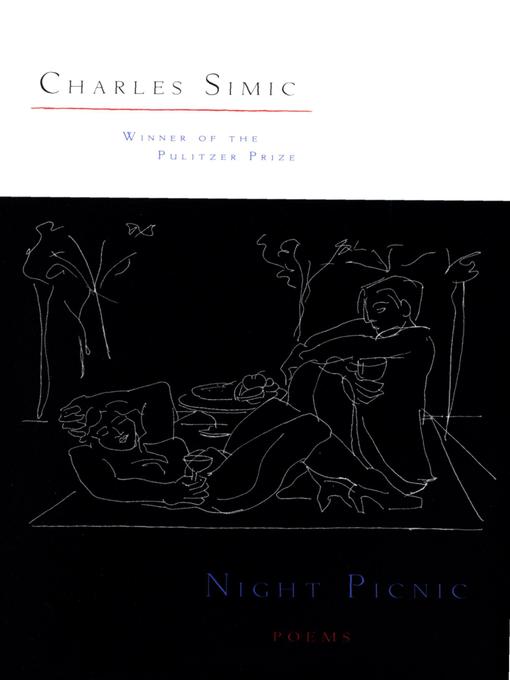
Night Picnic
Poems
- اطلاعات
- نقد و بررسی
- دیدگاه کاربران
نقد و بررسی

June 18, 2001
Simic's accomplishments as an American poet have deep roots in his wartime-Serbia childhood: his sly, uncanny arrangements of household words in short poems—some comic, others genuinely scary—convey a sense of menace everywhere, and of gentle, sad sarcasm as the right response. This first book of poems since 1999's Jackstraws
continues Simic's familiar, unsettling methods and extends them into the terrain of older age. In "Past-Lives Therapy," "a straw-headed boy in patched overalls" becomes a man "constructing a spaceship out of a coffin"; in "Three Doors," "Some fellow/ with that it-pays-to-be-cagey look" stands in for the cagey poet. "Icarus' dog," "aesthetic paradox," "a Jesus lookalike/ Who won a pie-eating contest in Texas," a Kafkaesque "small nameless bug" and an empty schoolhouse add to the well-stocked gallery of amiable grotesques, among which "we the bewildered" make our way. The third and most moving of the book's three parts departs from Simic's usual pattern, offering saddened epigrams followed by powerful meditations on death and old age, considered as a raindrop, as a kitchen or as a restaurant—"The check is being added in the back/ As we speak." Simic's poems can grow predictable in their methods—image succeeds image, each short-lined stanza as haunting or hard-boiled as the next. But Simic (who won a Pulitzer for The World Doesn't End) remains a powerful, and funny, chronicler of an individual world—one where pastry, omelets and queen-size beds offer their ambiguous pleasures, and where, inseparably, "the butchery of the innocent/ Never stops." It is a world that should be familiar. (Sept.)Forecast:Simic's last few books received admiring press from all over, helped in part by his increasing prominence as an essayist (The Unemployed Fortune Teller and
Orphan Factory) and book reviewer. This strong collection should at least equal recent volumes' success, and should be a contender for major awards. A collected or ra evised selected volume can't be far behind.

September 1, 2001
This follow-up to the recent Jackstraws (LJ 3/1/99) finds Simic in a relatively benign and domestic frame of mind. While his predilection for dread and his predisposition toward surreal non sequiturs haven't entirely vanished, the poet more often turns his attention to the mundane: objects on a dresser, unmade beds, a gas station, strolling lovers ("I was warm, so I took my jacket off/ And put my arm around your waist/ and drew you to me"). Simic's tone is generally flat and matter-of-fact, and if evil intrudes, it barely ripples the easygoing delivery ("The devil's got his finger in every pie"). The poems are vignettes, ordinary or quirky scenes displayed at face value, vaguely inviting the reader to extend them beyond their uncertain borders via glancing references to churches, angels, and saints convenient ciphers meant to suggest a metaphysical dimension more easily implied than articulated. Like the "Tree of Subtleties" he describes, Simic intends to hint "at dark secrets still to be unveiled," but blanched of sharp linguistic edges or striking images, the hints just aren't compelling enough. Fred Muratori, Cornell Univ. Lib., Ithaca, NY
Copyright 2001 Library Journal, LLC Used with permission.

August 1, 2001
Simic illuminates the shadow side of life in poems as perfectly formed and directed as the beam of a flashlight. He sees lovers in cemeteries after dark and ponders the secret lives of rats, crows, and worms, yet his noir outlook abates just enough to make room for a new strain of sardonic humor and a keen sense of the entanglement of the erotic and the doomed. Unexpected juxtapositions hit the brain like a whiff of smelling salts as he decodes the mixed messages of a street on a hot night--a thread of opera set against "the city boiling in its bloody stew," a couple French-kissing while the homeless lie in "dark doorways"--and considers various unlikely Christ figures, including a "Jesus lookalike / who won a pie-eating contest in Texas." Nabokovian in his caustic charm and sexy intelligence, Simic perceives the mythic in the mundane and pinpoints the perpetual suffering that infuses human life with both agony and bliss.(Reprinted with permission of Booklist, copyright 2001, American Library Association.)




دیدگاه کاربران